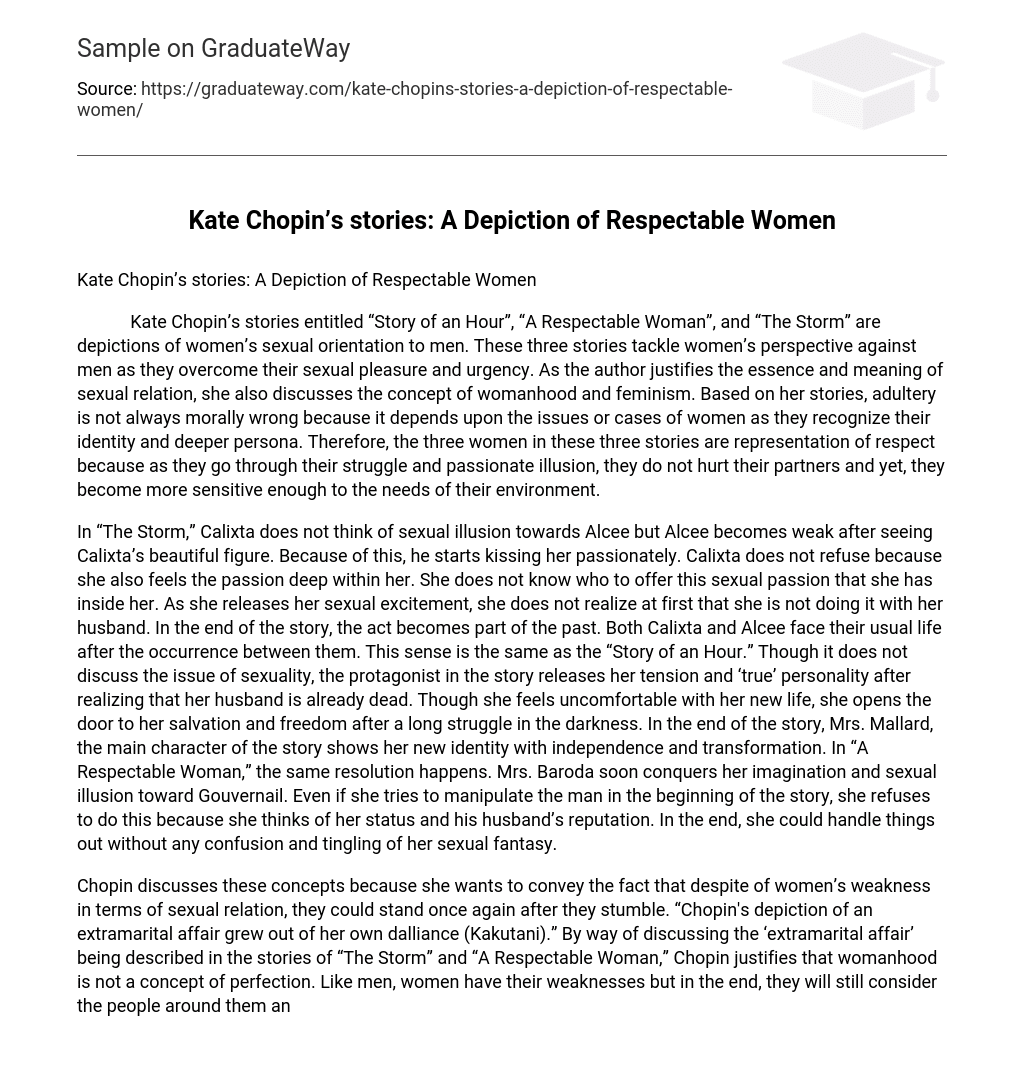Kate Chopin’s stories entitled “Story of an Hour”, “A Respectable Woman”, and “The Storm” are depictions of women’s sexual orientation to men. These three stories tackle women’s perspective against men as they overcome their sexual pleasure and urgency. As the author justifies the essence and meaning of sexual relation, she also discusses the concept of womanhood and feminism. Based on her stories, adultery is not always morally wrong because it depends upon the issues or cases of women as they recognize their identity and deeper persona. Therefore, the three women in these three stories are representation of respect because as they go through their struggle and passionate illusion, they do not hurt their partners and yet, they become more sensitive enough to the needs of their environment.
In “The Storm,” Calixta does not think of sexual illusion towards Alcee but Alcee becomes weak after seeing Calixta’s beautiful figure. Because of this, he starts kissing her passionately. Calixta does not refuse because she also feels the passion deep within her. She does not know who to offer this sexual passion that she has inside her. As she releases her sexual excitement, she does not realize at first that she is not doing it with her husband. In the end of the story, the act becomes part of the past. Both Calixta and Alcee face their usual life after the occurrence between them. This sense is the same as the “Story of an Hour.” Though it does not discuss the issue of sexuality, the protagonist in the story releases her tension and ‘true’ personality after realizing that her husband is already dead. Though she feels uncomfortable with her new life, she opens the door to her salvation and freedom after a long struggle in the darkness. In the end of the story, Mrs. Mallard, the main character of the story shows her new identity with independence and transformation. In “A Respectable Woman,” the same resolution happens. Mrs. Baroda soon conquers her imagination and sexual illusion toward Gouvernail. Even if she tries to manipulate the man in the beginning of the story, she refuses to do this because she thinks of her status and his husband’s reputation. In the end, she could handle things out without any confusion and tingling of her sexual fantasy.
Chopin discusses these concepts because she wants to convey the fact that despite of women’s weakness in terms of sexual relation, they could stand once again after they stumble. “Chopin’s depiction of an extramarital affair grew out of her own dalliance (Kakutani).” By way of discussing the ‘extramarital affair’ being described in the stories of “The Storm” and “A Respectable Woman,” Chopin justifies that womanhood is not a concept of perfection. Like men, women have their weaknesses but in the end, they will still consider the people around them and choose to live a better life rather than thinking of themselves alone.
The women in the three stories are still respectable despite of their ideologies and illogical actions. “Her (Chopin) carefully crafted, lucid short fiction reflected what she knew best: Creole culture in the American Deep South and the conflict between personal desire and societal obligations faced by married women during the Victorian era (Kort).” Chopin deconstructs the traditional perception of the society towards womanhood. She wants to convey that women are humans – with ‘horns’ in their head. However, they are still respectable in the sense that they do not want their partners suffer. Even if the main characters in the three stories show their personal conflict, they still strive to become better individuals in the eyes of their partner or even the society. This is somehow an important value for the reason that despite of the past, women are still women. Even if they made a mistake, they will still love and learn everything after the blunder.
Mrs. Mallard, Mrs. Baroda, and Calixta are portrayals of selfless identity. These three characters show that they are aware of the situation around them. If they think of themselves alone, they will leave all things behind without recalling their past. However, this is not the resolution of the stories. “Chopin sees “awakened” sexuality itself as more “destructive than life-affirming. (Gilbert).” This justification signifies Chopin’s better understanding of sexuality and identity of her characters. As she deconstructs the typical perspective of culture towards women, she becomes more passionate with her sense of womanhood.
In conclusion to this, it can be said that the three characters in the three stories are respectable because they represent reality within the civilization. The three women show the real feelings or emotions that they acquire through their environment. Through this, they learn the fact that they have their limitations that needs to be considered not only by them but also by their surroundings. Being respectable is not just by playing-safe and not risking every situation but also through recognition of worldly actions that we continue to identify, learn, and understand. The three characters show this consciousness as they go through their individual conflicts that mould their identity as human beings.
Works Cited
Chopin, Kate. “The Storm.”
Chopin, Kate. “Story of an Hour.”
Chopin, Kate. “A Respectable Woman.”
Kakutani, Michiko. “Books of The Times; A Woman Who Portrayed Adultery and Paid for It.(Cultural Desk).” The New York Times. (Nov 27, 1990): NA. Opposing Viewpoints Resource Center. Gale. Dallas County Community College. 3 Dec. 2008 ;http://find.galegroup.com/ovrc/infomark.do?;contentSet=IAC-Documents;type=retrieve;tabID=T004;prodId=OVRC;docId=A175595816;source=gale;srcprod=OVRC;userGroupName=txshracd2500;version=1.0;.
Kort, Carol. “Chopin, Kate.” A to Z of American Women Writers, Revised Edition, A to Z of Women. New York: Facts On File, Inc., 2007. American History Online, Facts On File, Inc. http://www.fofweb.com/activelink2.asp?
ItemID=WE52;iPin=AWWP0034;SingleRecord=True (accessed December 3, 2008).
Schwarz, Benjamin. “Major minor.(‘Kate Chopin: Complete Novels and Stories’)(Book Review).” The Atlantic. 290. 4 (Nov 2002): 125(1). Opposing Viewpoints Resource Center. Gale. Dallas County Community College. 3 Dec. 2008





